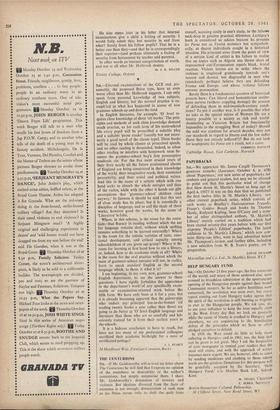SIR,—External examinations of the GCE and, pre- sumably, the proposed
Beloe type, have an even worse effect than Mr. Holbrook suggests. I can only speak from personal knowledge of two subjects, English and history; but the normal practice is ex- empliied in what has happened in scores of new grammar schools up and down the land.
In English literature, for example, '0' level re- quires close knowledge of three 'set books.' The prin- ciples and methods of such close jcnowledge demand much practice, so for each term of his main-school life every pupil will be prescribed a suitable play and a suitable 'prose reader' (usually but not neces- sarily a good novel of the classic type). These books will be read by whole classes at prescribed speeds, and no other reading is demanded. Indeed, to allow other reading tei interfere with homework soon be- comes the grammar-school boy's first presumptive academic sin. For the five most crucial years of their lives nearly all the future professional classes of England are being constricted in their knowledge of the world, their imaginative reach, their emotional perceptivity, and their social and political values. And this in the name of a system which with one hand seeks to absorb the whole energies and time of the victim, while with the other it hands out glib assumptions that 'grammar-school children read anyway.' In fairness it should be said that this sort of close study has its place; but it is essentially a discipline of language, and to call the study of three works, however good the works, by the name of 'Literature' is false.
Where, in this scheme, is the room for the essen- tials—that fluency in reading without which the ear for language remains deaf, without which spelling remains something to be learned externally? Where is the room for the infinite varieties of taste, emo- tional development, and critical capacity among schoolchildren of any given age-group? Where is the room for learning at first hand how to use a library, or, indeed, how to do academic study at all? Where is the room for the oral practice without which the mass of grammar-school entrants will not, in reality, ' learn to speak standard English as the second language which, to them, is what it is?
I am beginning, in my own, new, grammar-school English department, to see the answer to these questions. 1 have rigidly forbidden the appearance in the department's work of any specifically exam- inable or examination-oriented work before the fifth form. We have only been at it for a year, but it is already becoming apparent that the guinea-pigs who endure my/ principal bee-in-the-bonnet (of reading twenty books a year rather than three) are going to do better at '0' level English language and literature than those who arc so carefully and lab- oriously trained for it from their earliest years in the schools.
It is a hideous conclusion to have to reach, but have not too many of my professional colleagues sacrificed their academic birthright for a mess of certificated pottage?
J. J. PEARCE 54 Mayflower Way, Farnham Common, Buds






































 Previous page
Previous page